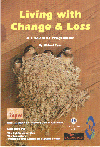|
|
||
|
Living |
||
|
|
The rationale for introducing Living with Change & Loss Education could be summarised as follows: Philosophical Bereavement, change and loss are inevitable in life. As professionals involved in the ongoing education process, a worthwhile Change, Death and Loss programme could perhaps facilitate some contemplation of and preparation for this inevitability. Hopefully it could also serve as an ongoing catalyst for fulfilment in life itself. Educational Traditionally, if bereavement and loss education occurred it was typically reactive and confined to a rather awkward and 'uncertain' process of monitoring the wellbeing of those students who experienced bereavement or loss. Perhaps a pro-active programme could seek to ensure that all students had some exposure to possible coping strategies, while simultaneously developing personal awareness and mutual support skills in a positive environment i.e. to help all students become skilled in coping with change, loss and death throughout life. Social Many young people experience loss through parental separation and current research suggests that some experience serious adjustment difficulties: Current research is showing that the incidence of depression has significantly increased among young people and suicide is now the greatest killer in the 15-25 year age-group (Kelleher, M. 1996) Spiritual and Moral For others bereavement occurs in an increasingly de-spiritualised world, where traditional support structures associated with religious practice andbeliefs are no longer guaranteed. The value of life, and death as a profoundly significant event, may be trivialised in the consciousness of young people, as computer games and some cinematic experiences present death as an almost routine emotionless experience Many thanatologists claim that death in the western world is becoming 'sanitised', 'commercialised' and 'routine-ised'. (Brown, E. 1997) Suburbanised Society Ireland has become an increasingly suburbanised society where rapid social and economic change has also meant that the extended nuclear family living in close proximity is no longer the norm (even the traditional nuclear family structure is undergoing rapid change.) Elderly people frequently live geographically and psychologically removed from their children and grandchildren. When serious illness occurs, hospitalisation and institutionalised death are the norms. This can reduce the impact of illness and death on the day to day lives of other family members. Frequently children and teenagers are no longer in close contact with the ageing process, associated illness and actual death. |
Life Expectancy Life expectancy has increased and an increasing number of people live in a suburban culture where community belonging and cohesiveness are not guaranteed. It is therefore possible that an increasing number of people may not have any contact with the loss of a family member until they are in their thirties. This can increase the difficulties for the bereaved who have not developed a sense of the inevitability of death and loss from an earlier age. According to some bereavement counsellors there is increasing demand for bereavement counselling among this age group. It can be difficult to process the associated grief in a climate of materialism, where some of the supportive networks (including time for quality communication) associated with previous generations may not be available. Staff Development and Empowerment Faced with the reality of inadequate professional counselling, psychological and support services within Irish schools - almost every teacher is confronted with a significant challenge - in attempting to respond to student needs in this area. Perhaps by investigating the issue of Bereavement and Loss Education - teachers, pupils and parents could become more confident and skilled to respond effectively to the inevitable losses of life. In the process there can be a valuable mutual journey of self awareness and empowerment. Collectively the above rationale highlights the necessity for a closer examination of how the school community can initiate an enlightened and professional response to a complicated pastoral theme. |
|---|---|---|
|
rogrammes | Newsletter | Contact Us | Services | Membership | Home Copyright iapce. Marino Institute of Education, Griffith Avenue, Dublin 9. |
||

